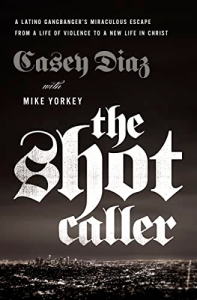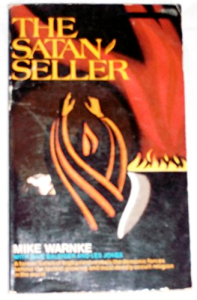CavWife is something of a sucker for Christian biographies that are “outside the box”, meaning people who came from a variety of unusual backgrounds, unlikely converts and their unlikely circumstances. So, when a book was mentioned at BSF she wondered if our local library had a copy. They had two. One is currently at our home, and she made me read it.
That book is called The Shot Caller by Casey Diaz with Mike Yorkey. It is not to be confused with a movie of the same name currently on Netflix. The forward is by Nicky Cruz whose story is part of Dave Wilkerson’s The Cross and the Switchblade, and in his own Run, Nicky, Run. Diaz is something like a next generation Nicky Cruz.
The book is written in very basic English, appealing to people in similar circumstances as his own. It moves at a quick pace, there is no being bogged down in details or superfluous material. It is engaging.
His parents took the 1 year-old Darwin “Casey” Diaz from El Salvador to America in the 1970’s. He did have a green card, which matters later in his life.
His father was an abusive alcoholic and his mother worked hard to keep the family afloat financially since working was only a hobby of his father’s. Young Darwin never felt love from his father, but rather animosity. In other words, he was a kid ripe for the gangs of Los Angeles.
From the age of 11 he was part of gang life after being jumped in. He looked up to the most violent and dangerous members of the gang and became one of the most violent and dangerous members of the gang. He was regularly doing stretches of time in juvenile detention. He was guilty of assault, robbery and theft.
One day he was eating in a restaurant when a group of guys from a rival gang stormed in to exact a measure of revenge. He was able to make it to his car where he had a shot gun. He murdered one of the other gang members in plain view of the neighborhood. He was a wanted man.
Still being a minor, he began his lengthy sentence in juvenile detention, working his way up the ranks. He was initially in some lower security prisons as an adult and eventually became the shot caller.
The shot caller is the guy on top who makes all the decisions, or calls the shots. He decides who gets a beating and who gets killed. He is the keeper of the shiv and hands them out when needed. He no longer does the dirty work himself.
This got him sent to New Folsom prison and the Security Housing Unit (the SHU) or solitary confinement. He was considered too dangerous to be in the general population of the prison.
He writes of the struggles of extended time in the SHU. He spent years there and some men when crazy. He’d be let out for an hour a day but even then was not interacting with other inmates. He rejected all offers to go to Bible Studies. He was raised nominally Catholic and wanted nothing to do with religion. The gang was his family, his faith.
One day a little old black woman discovered his cell, which was difficult to see in the hall. She would say Darwin with quite the southern drawl. She told him God loved him, she was praying for him, and God had big plans for him. Dah-win didn’t care
The Westminster Confession speaks of the ordinary means of grace, implying that when people are in extraordinary circumstances God may use extraordinary means to reveal Himself. Diaz was cut off from the ordinary means of grace. What he describes is extraordinary. Some may not believe it, it may be outside their experience and comfort zone. There may be the “Warnke Effect” from some.
In the 1980’s there was a “Christian comedian” named Mike Warnke. His act was funny. He billed himself as a former Satanist in his act and his book The Satan Seller. It certainly fit into that category of biographies my wife is drawn to like a moth to the flame. In the 1990’s Cornerstone Magazine did an exposé on Warnke showing that it all was, in fact, an act.
I was still a fairly young Christian when this happened (along with the Baker scandal). I have a(n) (un)healthy dose of skepticism. I do have a theological view that does open the door for the extraordinary in extraordinary circumstances. That he’s been in the faith for 30+ years lends some credibility to what he details.
After over 3 years in the SHU he saw a movie of his life on the wall. His sin was on display. And then he saw a man carrying a cross who was then crucified. He then heard a voice, “Darwin, I did this for you.” He was on his knees, confessing his sins.
His was a life changed. He was changed enough that he was place unexpectedly back in general population. This created problem a problem. He would be expected to resume his role in gang activity and this was contrary to his faith. He had to tell them he was out because Jesus mattered more.
This was a death sentence in a high security prison filled with murderers. Mosca appeared at his cell one day with the warning because he’d been tasked to kill Casey. He wanted to Casey to “repent” because he respected him and didn’t want to kill him. Casey said it was okay, he forgave him.
The next day Mosca showed up when the cell door opened for breakfast. Instead of rushing in to kill him Mosca simply said, “I can’t do this.” He simply shared the gospel with Mosca who then chose Jesus over the gang. He too was likely to be killed.
Instead of dishing out swift “justice” and killing them both, the gang leaders decided they would get regular and brutal beatings. For months they would be jumped. This was a challenge to his faith. One day in anger he tore up his Bible. One day he beat the daylights out of the man sent to beat him up. But he then sought the man out and asked his forgiveness. The beatings came to an end and the evangelism, as he says, began.
Actually being paroled was quite rare. Casey never thought he had a chance. At a hearing a pastor showed up to provide moral support. He had no expectation of parole and told them he didn’t deserve to be paroled. But he was.
He was then promptly arrested by INS. Despite having his green card, as a felon they could deport him to El Salvador. He knew no one there and his Spanish was no muy bien. He figured he had no wife and kids to leave behind, God was with him so it would be okay. The men from Mexico in the holding cell with him were in different circumstances. They had wives and kids, and no Jesus. So Casey lead them down the Roman Road and gave them unopened Spanish Bible that were in his belongings.
In another surprising turn of events, they released Casey instead of deporting him. The INS agent had seen plenty of jailhouse religion, but Casey, he said, was different. He didn’t fall apart. He was a Christian too and wanted Casey to stop by the office and give his testimony.
Back in Los Angeles, an uncle gave him a job and he found a church. He began to evangelize. He doesn’t go into depth in this part of his life. He did stay away from his old neighborhood since he didn’t want to get sucked back in, or experience more retribution. He would get married, have kids and after an apprenticeship was able to buy his own sign business.
The book concludes with an appendix on helping kids out of gangs.
His is an interesting, unusual testimony told at a fast pace. It was worth reading to remember that none of us is too far gone that Jesus can’t reach us. It is worth remembering that none of us is too damaged for Jesus not to use us. It is worth remembering that we are not the real Shot Callers of our lives, Jesus is.
























